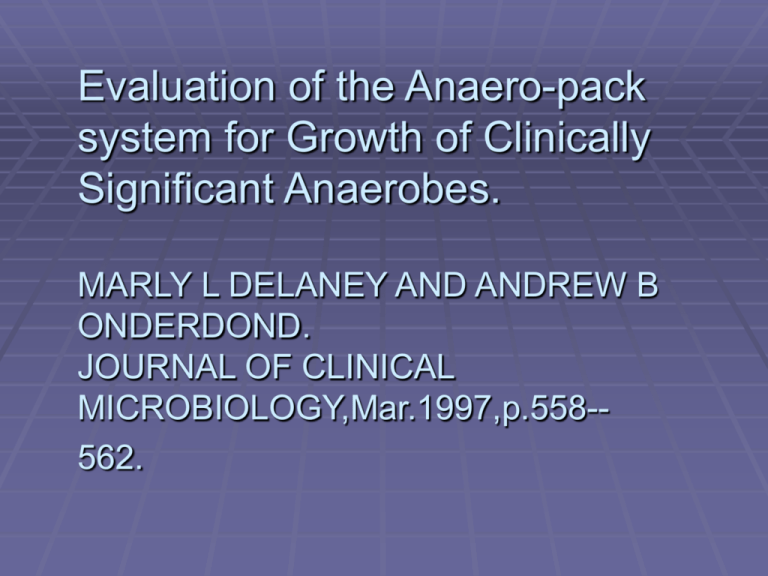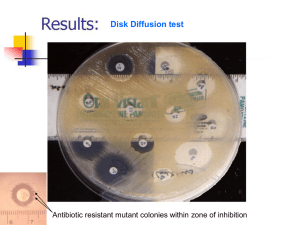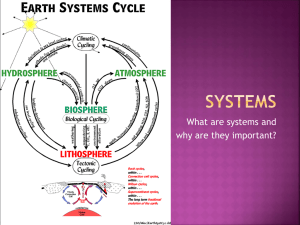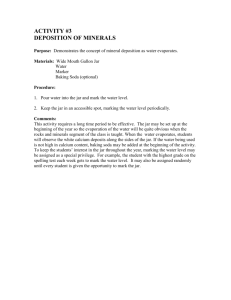Evaluation of the Anaero-pack system for Growth of Clinically
advertisement

Evaluation of the Anaero-pack system for Growth of Clinically Significant Anaerobes. MARLY L DELANEY AND ANDREW B ONDERDOND. JOURNAL OF CLINICAL MICROBIOLOGY,Mar.1997,p.558-562. Presented By: Dr.Salma Ahmed M.Phil Thesis part Introduction. Anaerobic bacteria are the causative agents in a wide variety of human infection of the skin and soft tissues and the respiratory, gastrointestinal and female genital tracts. Many anaerobes grow more slowly than facultative or aerobic bacteria .It is critical to optimize growth conditions to obtain prompt and reliable culture results Introduction Anaeropack, a novel anaerobic atmosphere generating system, is a disposable oxygen absorbing and carbon dioxide generating, sealed, porous sachet for use in anaerobic jars or pouches. The Anaeropack does not require the addition of water or the use of palladium catalyst. The sachet contents become activated on contact with oxygen. Introduction • Once the Anaeropack is placed into a sealed container, the atmospheric oxygen in the container is absorbed and the oxygen level is reduced to less than 1% in 30 min, Simultaneously carbon dioxide is generated to a concentration of 18% 12 min. •The BBL Gas pack Anaerobic system consists of the Gas pack Hydrogen and carbon dioxide generator envelop and a room temperature palladium catalyst in the jar. Introduction The system require the addition of water to produce hydrogen ,which combines in the presence of fresh palladium catalyst with atmospheric oxygen to form water and produce anaerobic condition . Within 2 h of incubation at 35 degree c the oxygen conc is less than 1% and carbon di oxide is approxymately 4-10%. Materials and Methods Bacterial isolates---A total 150 anaerobic strains were obtained from the frozen stock culture collection of the Anaerobic Research laboratory. Of the 150 strains, 140 from clinical specimen. Ten reference strains from the American Type Culture Collection (ATCC). Coy anaerobic chamber flexible glove box kept at 35 degree c and filled with an atmosphere of carbon dioxide ,10%hydrogen and 80% nitrogen. M&M BBL gas pack system The Gas pak system included the Gas pak jar with a catalyst chamber containing new palladium pellets and the Gas pak Anaerobe envelope. Gas pak anaerobe envelope was placed in each jar and 10 ml 0f water was added to the envelop. Freshly conditioned palladium catalyst was added to the jar and the atmospheric conditions in the jar system were monitored with a disposible BBLDry Anaerobicindicator strip(becton dickenson) M&M Anaeropack system included the medium sized anaeropack rectangular container and two anaeropack sachets. The sachets were removed from their foil packs and placed in the containier along with disposible BBL Dry Anaerobic indicator strip to monitor the atmospheric condition. M&M Media Brucella base agar with 5% sheep blood containing 0.01 g of both hemin and vit k 1 per litre.BMB. Brucella base agar with 5% laked sheep blood,100 micro gram of kanamycin, 7.5 micro gram of Vancomycin per ml and 0.01 g of both hemin and vitamin k1 per litre .(KLV). Phenyl ethyl alcohol anaerobic agar with 5% sheep blood.PEA. Result The rate and quality of growth of the 150 anaerobic bacterial strains grown in a Coy anaerobic chamber were compared with those of the same strains grown in three anaerobic atmosphere generating system ---the anaeropack system, Gas Pac system and the anaeropack sachet in the gas pak jar. At 24 hrs 95%of the isolates tested grew in the Anaeropack and Gas pak system better than the anaerobic chamber.Anaeropack sachetin the Gas pack jar 96% grew. Results At 48 hrs Anaeropack system performed slightly better than the Gas pak system. A mean growth based on plate growth ,was determined for each genus tested at the various incubation periods, and the result following 24 and 48 h of incubation are presented . The growth differences seen were not statistically significant .(p value more than0.05 by paired t test ) for the various genera tested with the exception of bacteroids and peptostreptococcus spp. Results Following 24 h of incubation Bacteroids grew better in al the atmosphere generating system than in the chamber. By 45 h bacteroids isolates grown in the chamber exhibited growth similar to those of isolate grown in the atmosphere generating system . However the Anaeropack system singficantly bettergrowth compared to that in the Gaspac jar p=0.0107 and p=0.0162 for anaeropac system and the Anaeropack sachet in the gas pac jar . Results Peptostreptococcus spp grew significantly better in the atmosphere generating system than in the chamber following 24 h of incubation (p=.0003,P=.ooo5, P less than .ooo1) for the Anaeropack system, Gaspak system and Anaeropack sachet in the Gaspac jar respectively. At 48 h peptostrepcoccus spp grew equally in the chamber and in the Gas pac jar ,whereas growth in the Anaeropack system was significantly better compared to that in the chamber or the Gaspak jar(P=0.0438 for the Anaeropac system and p=0.0182 for the anaeropack sachet in the Gas pak jar vs chamber, P=0.0024 for the Anaeropack system and p=o.oo15 for the Anaerpack sachet in the Gaspak jar vs the Gaspack jar. Discussion The present study indicates that the Anaeropack sachet along with the Anaeropack rectangular container is a highly effective system for creates an anaerobic atmosphere. The Gaspak system failed 15% of the time.Anaeropack sachets in the Gas pak jars failed 7% of the time. Discussion The Anaeropack container were brand new. Where as the Gas pak jar had been used for several years. The anaeropack system is easier to use than the Gas pak system . The initial growth in the Anaeropack system after 24 and 48 h of incubation was equal to or ,in many cases ,better than growth after incubation in the chamber or in the Gaspak system. Conclusion The Anaeropack atmosphere-generating system proved to be highly effective in establishing and supporting the growth of clinically significant anaerobic bacteria. The ease of setup and maintenance of the Anaeropack system makes it an excellent alternative to the Gas pak system.






